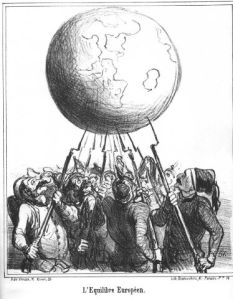Michael Desch’s cover story, “Apocalypse Not,” argues that while Iran is nowhere near having nuclear weapons, things wouldn’t be so bad even if it did have them. Desch quotes some of the overheated rhetoric of anti-Iranian hawks. One line that stuck out for me was a quote from Israeli prime minister Binyamin Netanyahu: “You don’t want a messianic apocalyptic cult controlling atomic bombs. When the wide-eyed believer gets hold of the reins of power and the weapons of mass death, then the entire world should start worrying.” To which an uncharitable observer might add, he should know…
In response to assertions of this sort, Desch points out, first, that deterrence kept both Joseph Stalin and Mao Tse-tung from using nuclear weapons, and no one seriously argues that Iran’s leadership today is more warlike than were Stalin or Mao. Second, the Iranian political system does not centralize decision-making to any one man, as the Soviet and Chinese systems did in the days of Stalin and Mao. Therefore, it is far less vulnerable to the paranoid delusions of a single leader than were the systems those men dominated. So if nuclear deterrence was good enough to keep Stalin and Mao in check, it should be good enough to keep Ahmedinejad in check as well. Desch goes further, arguing that acquiring a nuclear arsenal might even lead the Iranian regime to become less difficult for its neighbors to live with. The existence of such an arsenal might enable the US and Israel to adopt a containment strategy towards Iran, which might lead to a mellowing of the regime, as the Soviet regime mellowed in the decades of containment following Stalin’s death.
Stuart Reid claims that “The truth is that man is no longer civilized enough to wage war.” What we call war, earlier ages would have seen as sheer murder.
A review of Defending the Republic: Constitutional Morality in a Time of Crisis commends its authors, conservative legal scholars and political theorists, for recognizing that while the center-left still tries to use the courts to do what should be done through the elected branches of government, “there is an anti-constitutional Right as well.” Irving Babbitt scholar Claes G. Ryn contributes an essay to the volume in which he equates the neoconservatives with the Jacobins of the French Revolution, likening the wars of the Bush/Cheney years with the Vendée and the first stirring of Napoleon’s campaigns of conquest. The title of Ryn’s essay is “Neo-Jacobin Nationalism or Responsible Nationhood?,” proposing a dichotomy of the sort Babbitt would have relished. Ryn develops the same dichotomy here.

No comments:
Post a Comment